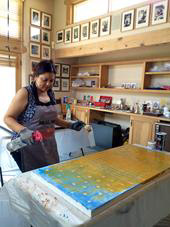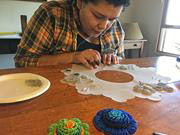Statement of John Molloy, President, ATADA*
Written Testimony submitted to U.S. Senate Committee on Indian Affairs
For the Hearing: Cultural Sovereignty Series:
Modernizing the Indian Arts and Crafts Act to Honor Native Identity and Expression
Hearing date July 7, 2017 – Submitted for the Record July 17, 2017
Santa Fe, New Mexico
ATADA is an international organization honoring the artistic vision of indigenous people.
ATADA represents professional dealers of historic and contemporary tribal art from around the
world. We support the lawful circulation, trade, collection, preservation, appreciation, and study
of art and artifacts from diverse cultures.
Our objectives are to promote ethical and professional conduct among art dealers, to encourage
the responsible collecting, research, and study of tribal arts and culture, and to educate the public in the contribution of tribal cultures to the wealth of human experience.
As a condition of membership, ATADA members guarantee the authenticity of all objects that they offer for sale.
ATADA is deeply concerned by the misrepresentation and mislabeling of Native American, Native Alaskan, and Native Hawaiian works of art and craft. Misrepresentation deceives individual consumers and the public. When misrepresentation occurs, it also damages the reputation of the art trade as a whole. Bad business practices by a few bad apples can negatively impact many honest traders, Native artisans, art dealers, and other important commercial interests. There is a trickle-down effect to all legislation affecting Indian arts and crafts which impacts much larger constituencies and business interests, whether they are those of workers in the cultural tourism industry, or the diverse businesses that depend upon tourism, especially in the Southwestern region.
It is early in the legislative process and no specific amendments to the Indian Arts and Crafts Act have yet been proposed. Without having actual proposed amendments to respond to, ATADA states that it supports in principle the amending of the Indian Arts and Crafts Act to provide greater protections for consumers and the public, Native artists, and the legitimate art trade. However, ATADA notes that currently, prosecutors and tribal plaintiffs have excellent tools to combat fraud and misrepresentation in domestic matters, and to require proper, indelible labeling in foreign imports. The problem is not that stronger laws are needed; resolution requires more and stronger enforcement of existing laws, and funding to ensure that tribes are equipped to fight using the legal tools already to hand.
Testimony at the hearing by Damon Martinez, former U.S. Attorney for New Mexico, pointed out the need to distinguish between (1) steps to improve the U.S. Customs marking requirements for imports to ensure that the items are not later misrepresented, and (2) steps to halt and penalize misrepresentation and other unfair business practices in the U.S.
PROPER MARKING ON IMPORTED GOODS
Proper marking is a key issue, as has been made clear by the descriptions at the hearing of arrests and prosecutions of large scale wholesalers alleged to have imported copies of Native American jewelry from the Philippines. Continuing investigations and prosecutions of individuals and corporate entities found to be engaged in wrongful wholesale imports appears to be working very well and will put a significant dent in any fraudulent activity, if it does not end it altogether.
ATADA recognizes the inherent difficulties in indelibly marking very small objects (such as certain jewelry items) with the country of origin. Tagging protocols should not interfere with the lawful importation and sale of properly identified items. However, packaging and other options may provide a more flexible mechanism to make clear the origin of a very small object. Larger items could reasonably be indelibly marked through a variety of means.
If millions of dollars’ worth of fraudulently imported jewelry has been seized, as stated at the hearing, the federal government ought to do its best to fill this gap in inventory and at the same time, encourage economic development that would benefit tribal artists. One wonders whether the National Park Service could work with the Indian Arts and Crafts Board or with tribal communities to bring more authentic Native American arts and crafts into the federal parks’ concessions, especially in Indian Country, and make authenticity a primary selling point.
Native artists receive recognition for the authenticity of their work when it is sold in the U.S. or elsewhere is another important task, in which enforcement of consumer protection laws is key. Marking options that would distinguish authentic contemporary Native American artworks and crafts could facilitate enforcement.
Antique items cannot easily be marked without damaging the integrity of the object. No rules requiring marking should be employed for antique items. In this situation, consumers should be able to rely of a written receipt and guarantee that items are as represented; guaranteeing authenticity is mandatory for ATADA members already.
AUTHENTICITY AND CONSUMER RIGHTS UNDER STATE LAW
ATADA strongly supports strengthened scrutiny of items offered for sale to the public as Native American and rigorous enforcement of consumer protections. We note that in New Mexico (and in several other states) state consumer protection laws can be a significant deterrent to bad businesses. Government should provide flexibility under the Indian Arts and Crafts Act for the Indian Arts and Crafts Board to provide advice and support to plaintiffs regarding state laws as well. This could enable cases to be brought on behalf of artisans and consumers at a lower cost, and to reap greater damages from violators.
For example, New Mexico’s Indian Arts and Crafts Sales Act, NMSA 1978 § 30-33-7 makes it unlawful to barter, trade, sell, or offer for sale or trade any article represented as produced by an Indian unless the article is produced, designed, or created by the labor or workmanship of an Indian. NMSA 30-33-10 grants a private right of action to all consumers, and NMSA 1978 30-33-6 establishes a duty on the part of the seller to enquire whether an item is authentically Indian and a duty to correctly label the item at the point of sale.
Misrepresenting an item as Native American when it is not is a deceptive trade practice under NMSA 1978 § 57-12-2.D(4), which prohibits using deceptive representations or designations of geographic origin in connection with goods and services. Willful violation of the standards creates liability for sellers of non-Indian goods under New Mexico laws of triple actual damages or $300.00, whichever is greater, under New Mexico’s Unfair Practices Act, NMSA 1978 57-12-10.B.
Attorney fees for plaintiffs are more easily available under both New Mexico’s Unfair Practices Act (NMSA 1978 § 57-12-10.B) and the Indian Arts and Crafts Sales Act , NMSA 1978 § 30-33-1, both of which provide that on showing of a violation, the court must award attorney fees and costs.
COPYRIGHT AND TRADEMARK
Copyright and trademark were also briefly discussed at the hearing. Much of the discussion surrounding misrepresentation of Indian art at the hearing was in regard to wholesale importation of jewelry and textiles in imitation of Native American artistic styles. A “style” cannot be copyrighted, and even specific designs that are considered “traditional” were never copyrighted and are not eligible to be copyrighted now under the U.S. Copyright Act of 1976 (Public Law 94-553, October 19, 1976).
Nonetheless, the specific creations of contemporary jewelers and weavers may be copyrighted, if they are deemed “original” under the law and meet other copyright requirements. While acknowledging that federal trademarks can be expensive to acquire, ATADA suggests that tribal organizations might consider establishing tribal trademarks that would serve as both an identifying mark and a marketing vehicle. ATADA supports federal funding to facilitate economic development programs within the tribes to provide education and assistance in trademark and copyright for tribal artists and artisans through the Indian Arts and Crafts Board, tribal heritage offices or tribal governments.
CONCLUSION
ATADA urges the Senate Committee on Indian Affairs to consult with tribal government and economic development offices in order to determine the most direct and effective means of establishing authenticity for artworks in the market. The most successful measures will be those that boost consumer confidence and encourage the artists of the Native American community to continue to produce the outstanding works of art that represent Native American creativity and skill and that have come to symbolize the wonderfully diverse and unique Southwestern culture.
ATADA looks forward to further discussions with the Senate Committee on Indian Affairs on this and all other legislation affecting the interests of the trade in contemporary and antique Indian art.
*ATADA is a professional organization established in 1988 in order to set ethical and professional standards for the art trade and to provide education for the public. ATADA membership has grown to include hundreds of antique and contemporary Native American and ethnographic art dealers and collectors, art appraisers, and a strong representation of museums and public charities across the U.S., dedicated to the promotion, study and exhibition of Native American history and culture.
www.atada.org. email: director@atada.org, PO Box 45628, Rio Rancho, NM 87174.













